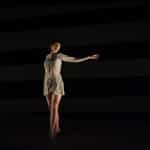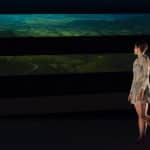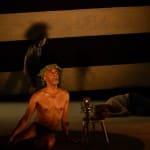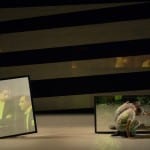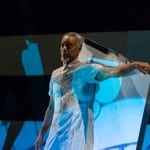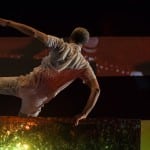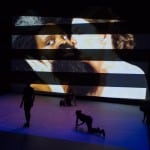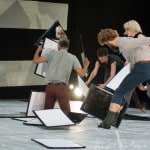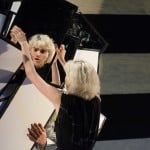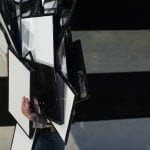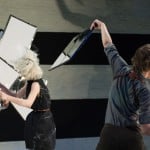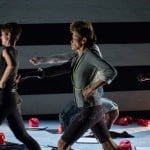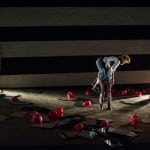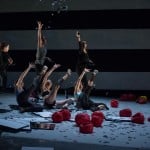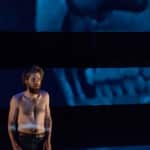Dean Moss: johnbrown
Steeped in a childhood of grassroots organizing and pitched campaigns, multidisciplinary artist Dean Moss draws from an intimate and varied history with activism to create johnbrown—a dark, wry meditation on the legacy of the white 19th-century abolitionist, as well as the racial, gender, and generational processes at play in the inquiry. The result of three years of research, johnbrown layers live choreography and text with video performances of an original script by Thomas Bradshaw and a score by Stephen Vitiello. Moss also incorporates a group of locally cast teenagers as production assistants. Presented in seven semi-autonomous segments titled after individual articles of John Brown’s Provisional Constitution of 1858, johnbrown melds an immersive audio/visual design and rigorous physicality with a disruptive impressionistic performance structure.
A segment of johnbrown was commissioned and presented in-progress under the title Voluntaries by the Museum of Modern Art, New York. johnbrown in its entirety premiered at The Kitchen from October 16-25, 2014: the 155th anniversary of John Brown’s raid on Harper’s Ferry.
johnbrown is presented in collaboration with CounterCurrent — a festival of bold experimental art occupying unexpected sites in the city of Houston, presented by the University of Houston Cynthia Woods Mitchell Center for the Arts.
FREE, but seating is limited. Reservations are encouraged and can be made online through the CounterCurrent web site beginning March 17.
Why Teens?
August 2013
Marya Warshaw asks Dean Moss a question:
marya: “Why do you want teens in johnbrown?”
dean: Things don’t come to me all at once or maybe they do but I fail to understand them all at once and have to sift through multiple layers of ideas, feelings and experience to gain a modicum of understanding. It takes time. So at the beginning the sought for solution wasn’t at all about teens. It was this conceptual thrashing for a way to incorporate an essential aspect of audience participation. One that forwarded my practice in its exploration of self and other.
The investigation of viewer participation in my work has gone from a passive touring of an ongoing performance, to taking on the role of performers, to mirroring the artist/audience interplay as a utopic creative community. In all cases the viewer/participant entered a work created to articulate their onstage experience for access to a vulnerability unattainable by professional performers. The goal of these works was to generate a layered visceral/intellectual experience for both on and off stage audiences. Still the metaphor was of the performers presenting the audience participant (other) in an act of transition initiation, or becoming part of the work itself.
johnbrown was somewhat different. Because it considers a figure in history and evaluates a legacy, I saw myself and my practice as an outsider looking in: as other. But it was not an other in a transition to self (becoming/depicting John Brown or his legacy) as in past works, rather it was in transition to another other: fractured into time/space/race/politic distorted reference points. It took awhile to realize the deeper implication of the difference: that perhaps this work needed a circumstance where self was neither centralized point nor conceptual solution, but just another other. That democratizing insight changed the nature of audience participation in the production, flipping it from us articulating them, to them articulating us.
But what does this have to do with teens? In manifesting a decentralized viewpoint for the performance of johnbrown several strategies were put into place. They involve a segmented structure, the use of multidisciplinary elements, and most relevantly a cross generational perspective that allows the work a certain paradox. As one part of the the production looks back 150+ years to assess and reflect upon historical figures, another part projects forward that process of looking, assimilated and revalued by young people at least a generation younger from the production’s creators. By thus assigning the role of arbiter to unfettered teens, the work is enabled to draw parallels not only to the immediate audience experience, but to the broad dissemination of change through culture over time.
To achieve this dynamic it’s crucial that the teens are intimate with the production: as technical assistants, documentarians, commentators, and audience doppelgängers. That they engage physically with craft and rigorous aesthetic process; discourse on history, otherness, and the power of radical compassion. That they share in the idealism of the work and thereby its risk of failure. Because in high-level risk and the idealistic attempt to surmount it one can discover selflessness and its role in the ability to achieve change. This is the same fundamental process that forced from the abolitionist a deeper sense of reflection and magnified his impact. The teens through their participation help mirror that process in johnbrown, and that is why I want them.
About Dean Moss
Dean Moss is a dance based multidisciplinary theater and media artist, curator and lecturer. His current research investigates perceptions of self and other through transcultural, multimedia performance collaborations often incorporating audience participation. He is the recipient of a 2014 John Simon Guggenheim Memorial Foundation Fellowship in Choreography; an inaugural Doris Duke Impact Award in Theater; a Foundation for Contemporary Arts Artists Grant Award; multiple MAPFund and NEFA National Dance Project grants, plus fellowships in Choreography and Multidisciplinary Works from the New York Foundation for the Arts. He also received a New York Dance and Performance “Bessie” Award for his work Spooky action at a distance.
Moss came to New York from Tacoma Washington on a Dance Theater of Harlem scholarship in 1979. He danced with David Gordon for ten years and has had a long relationship with The Kitchen – serving as the Curator of Dance and Performance from 1999-2004, then as a Curatorial Advisor through 2009. As a curator he conceived and organized programs such as “Talking Dance“ hosted by Lucy Sexton and Anne Iobst featuring performances by Bill T. Jones, Ann Carlson, Foofwa d’Imobilité, and works by Yvonne Rainer, David Gordon and Elevator Repair Service. Additionally he showcased rigorously innovative artists very early in their careers including: Miranda July, Sarah Michelson, Xavier LeRoy, Miguel Gutierrez, Yasmeen Godder, and Akram Khan. In 2012 Moss curated “Black Dance” with Pedro Jiménez, Young Jean Lee, and Ann Liv Young as part of the Parallels 2012 at the Danspace Project.
Distinctly independent yet deeply committed to facilitating artists, Moss has long ongoing artistic relationships to director/playwright Young Jean Lee and choreographer Yasuko Yokoshi. In 2002 he conceived an emerging choreographers composition workshop which was presented for three years at The Kitchen where it was facilitated in collaboration with Levi Gonzalez under the title “Form & Practice.” Additionally, Moss taught for a year as a Guest Professor at the Tokyo National University of Fine Arts and Music and two years as a Visiting Lecturer in the Department of Visual and Environmental Studies at Harvard University for which he received a Certificate of Distinction in Teaching from the Derek Bok Center for Teaching and Learning. In 2014 he conceived and developed, with Kimberly Bartosik and Joshua Lubin-Levi, THE AWARD: a non-monetary mentoring initiative for experimental dance artists.
In his work Moss employs collaboration and audience participation as a means to disrupt and enrich both his life and his practice. In addition to johnbrown his most recent premiere is Nameless forest (2011), a collaboration with Korean sculptor and installation artist Sungmyung Chun. Referencing Chun’s imagery the performance investigated existential narratives while engaging the audience in experiential rites of passage. Other collaborations include: Kisaeng becomes you (2009), with Korean traditional and modern dance choreographer Yoon Jin Kim – during which audience members were invited to embody the discipline and poetry of kisaeng – artist/courtesans of Korea’s Joseon Dynasty; and figures on a field (2005) with the visual artist Laylah Ali – incorporating a docent led tour of the work during the performance.
Support
Dean Moss’s johnbrown was made possible in part by a 2014 John Simon Guggenheim Fellowship (Moss), Doris Duke Impact Award (Moss), MAP Fund Production Grant, and a 2013-14 NEFA National Dance Project Production Grant and Touring Award funded by the Doris Duke Charitable Foundation with additional support from the Andrew W. Mellon Foundation, with additional support from the National Endowment for the Arts. johnbrown has received residency support from 651 Arts, the Martha Duffy Residency at the Baryshnikov Art Center, the Gina Gibney Dance Center DiP Residency Program, the BRIC Arts Media Artist in Residence Program, the Kelly Strayhorn Theater, and The Kitchen. A segment of johnbrown, under the title Voluntaries, was commissioned as part of Some Sweet Day at the Museum of Modern Art. The work was additionally made possible, in part, by the Danspace Project 2011-12 Commissioning Initiative with support from the Andrew W. Mellon Foundation; The Creative Explorations Fund of the Multi-Arts Production Fund supported by Doris Duke Charitable Foundation. johnbrown is the recipient of a Production Grant from The Rolex Institute.
This presentation of johnbrown is made possible by the New England Foundation for the Arts’ National Dance Project, with lead funding from the Doris Duke Charitable Foundation and The Andrew W. Mellon Foundation, with additional support from the National Endowment for the Arts.
DiverseWorks is a Partner of the National Performance Network (NPN). This project is made possible in part by support from the NPN Performance Residency Program. Major contributors include the Doris Duke Charitable Foundation, Ford Foundation, and the National Endowment for the Arts (a federal agency). For more information: npnweb.org.
